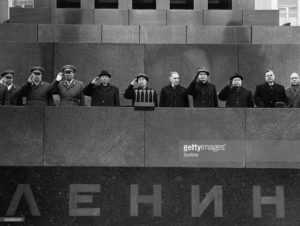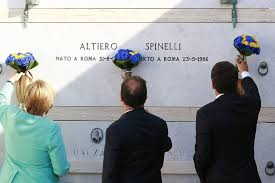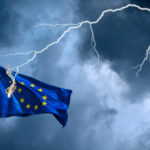It was Vladimir Bukovsky, a well-known Soviet dissident, who, having lived several years in the West, said these words about the European Union. Did he exaggerate or did he hit the nail on the head? Well, let us see1)Vladimir Bukovsky: EU = USSR, YouTube 2011-12-20..
An analogy is what it is: it is an analogy, not a mirror reflection. If history repeats itself, it repeats itself as a farce. Napoleon III had all the imperial trappings of Napoleon I and was but an echo of his predecessor. And: for those who are observant enough no proof is necessary; for those who cling to their dream-world no proof is possible. With this in mind let us draw a comparison between the European and the Soviet Union.
1 Symbols. The two structures are unions. They have commissioners or commissars (the USSR into 1940s) at the top. Their respective uni-color flags feature yellow stars. They have an anthem,2)The European anthem, European Union.and councils or soviets; soviet translates council. The Soviet Union had one currency, the European Union is about to have one. It was in 1903 in Brussels of all the places, that Russian Social-Democrats split up into Mensheviks and Bolsheviks. The latter took power in the Russian Empire and later on in Central Europe by way of a violent revolution; the former took power in Western Europe by way of the long march through the institutions.3)Antonio Gramsci: Take over the Institutions! The American Thinker 2014-04-26.The Order of Lenin (the founding father) was for Soviet citizens what the Charlemagne Prize also known after its first recipient the Coudenhove-Kalergi Prize (both founding fathers) is for the European: one of the highest decorations.
2 Structure. Both unions are governed by unelected people who are not responsible to anyone. Both unions have parliaments which for all practical purposes have no power. Central planning is a characteristic feature of them both: in the Soviet Union there were planners who steered the economy of the country from their desk; in the European Union there are detailed regulations and financial subsidies (inverted, hidden customs duties) that channel the joint economic effort of the population. In either union democracy is for show rather than for real: accepted party or parties rule and dissent is not welcome. Both structures churn out loads of laws, rules, and regulations; both combine a number of different states or republics, where the stronger (Russia and Ukraine on the one hand, and France and Germany on the other) impose their will on the smaller; the core countries of the initial European Union have their satellites in the form of new member states (these happen to be Central European states) the way the Soviet Republics had theirs in the form of befriended socialist states (these happened to be… again Central European states).
3 Ideology. Marxism-Leninism, the official ideology of the Soviet Union, metastasized into cultural Marxism of the European Union, where Marx, Engels and Lenin have been replaced with such disciples of theirs as Marcuse, Adorno and Spinelli: just as Soviet leaders would lay flowery tributes on Lenin’s Tomb, so the European Union’s leaders lay wreaths on Altiero Spinelli’s tomb. According to both systems they are historically warranted, leaving no alternative and only objected to by uneducated, unskilled and backward individuals. Soviet censorship has been substituted for by political correctness; internationalism has been renamed globalism; the working class and peasantry, the proletariat that occupied centre stage in the Soviet Union, have been dethroned (or rather disappeared or shrank as a result of a long historical process) and now it is colored people, women, sexual minorities and you name it that act as a new proletariat that has been elevated to the status of the protected social strata because they were once allegedly exploited and discriminated against. All that is being implemented by the apparatchiks is allegedly implemented in the name of the people. Failures are always called challenges: they are never recognized as failures. The leaders’ speeches are predictable and boring stiff. Religion was not and is not an option:4)The Brussels bureaucratic apparatus […] is “uncomfortable with religion,” said Lucian Leustean [in:] A More Secular Europe, Divided by the Cross.Christian churches were forcefully desecrated in the Soviet Union; they are falling into disuse in the European Union.5)The 105 delegates to the convention have wrestled over key areas of the draft, among them the “social values” of the EU. Pope John Paul II has pleaded for the recognition that as a “new institutional order, Europe cannot deny its Christian heritage, since a great part of its achievements in the fields of law, art, literature and philosophy have been influenced by the evangelical message.” The Vatican has not asked for a reference to Catholicism. Instead, the pope called for a strong reference to Europe’s Christian roots in the preamble, but secular forces have blocked that effort thus far. [in:] Ungodly Ways: The Dark Side of the European Union, Crisis Magazine 2003-06-01.National identities are the prime enemies of the ruling, rootless, cosmopolitan classes of both systems. Expansion is a must: the Soviet Union overreached itself to such diverse places as Cuba and Angola and Vietnam; the European Union is about to absorb Turkey, Ukraine, and Georgia. The ideologues in the Soviet Union tried to make people believe that the new system would set free an enormous productive potential in the masses; the European Union’s ideologues maintain pretty much the same in reference to the system of the free flow of capital, people and goods; here and there the ruling classes maintain that under new circumstances nations and social classes will come to respect, if not love, each other and all sources of conflict or tension will be overcome. In order to live and consolidate, both unions have external and internal enemies: in the case of the Soviet Union these were western countries and the United States; in the case of the European Union this is Russia and her allies; internally, in either case these are reactionary forces in the form of extreme right and nationalists. Both unions never wage wars: they help other countries get rid of dictators, restore socialism that nowadays goes by the name of human rights, and, yes you guessed it, democracy.
An analogy is what it is: it is an analogy, not a mirror reflection. If history repeats itself, it repeats itself as a farce. All post-communist parties from Central Europe whose members used to take orders from Moscow underwent an overnight metamorphosis and voted en mass to join their respective countries to the European Union to be able to take orders from Brussels. Why did they do it? Simply because birds of a feather flock together. If that is not evidence enough substantiating the affinities between the two systems, then what is? But then, for those who are observant no proof is necessary; for those who cling to a dogma no proof is possible.
 |
 |
References
| 1. | ↑ | Vladimir Bukovsky: EU = USSR, YouTube 2011-12-20. |
| 2. | ↑ | The European anthem, European Union. |
| 3. | ↑ | Antonio Gramsci: Take over the Institutions! The American Thinker 2014-04-26. |
| 4. | ↑ | The Brussels bureaucratic apparatus […] is “uncomfortable with religion,” said Lucian Leustean [in:] A More Secular Europe, Divided by the Cross. |
| 5. | ↑ | The 105 delegates to the convention have wrestled over key areas of the draft, among them the “social values” of the EU. Pope John Paul II has pleaded for the recognition that as a “new institutional order, Europe cannot deny its Christian heritage, since a great part of its achievements in the fields of law, art, literature and philosophy have been influenced by the evangelical message.” The Vatican has not asked for a reference to Catholicism. Instead, the pope called for a strong reference to Europe’s Christian roots in the preamble, but secular forces have blocked that effort thus far. [in:] Ungodly Ways: The Dark Side of the European Union, Crisis Magazine 2003-06-01. |




